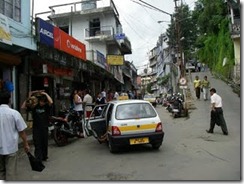By Rudroneel Ghosh
 The Mizoram transport department's move to deny registration of any automobile that is bought without proof of parking space needs to be replicated all over the country. In an upwardly mobile society like ours, owning a car is not just a matter of convenience.
The Mizoram transport department's move to deny registration of any automobile that is bought without proof of parking space needs to be replicated all over the country. In an upwardly mobile society like ours, owning a car is not just a matter of convenience.
It is representative of our status. It supposedly defines where we are on the social pecking order. It is this thinking that is the main driving force behind the third largest automobile market in Asia.
Given the furious pace at which cars are being added to our streets everyday, it is only natural that urban road space is at a premium. To counter this problem, we need to increase the cost of owning and maintaining a car.
It is all very well to say that the government should provide for better public transport facilities and dedicated parking sites. These suggestions have been on the cards for a long time.
Yet no state government can claim to have a plan in place to tackle the massive growth in the number of private vehicles. On the other hand, it is also true that people view public transport as a bitter necessity.
Unlike New York's taxis or London's double-decker buses, we hardly take pride in our public transport infrastructure. It is this lack of both supply and demand that needs to be addressed in order to decongest our roads. The new Mizoram regulation seeks to do precisely that.
Making proof of garage space a precondition for buying a car will indirectly put pressure on the authorities to sanction a greater number of parking projects. It will also nudge people towards public transport, creating sufficient demand for better facilities.
We must create the right conditions for people to take pride in their public transport infrastructure. The first step would be to detox a car-crazy nation with some tough laws.
A Counter View
Raises cost of mobility
In a move to ease vehicular congestion, Mizoram's transport authority has enacted a mandatory provision to have a garage for all new car owners in Aizawl.
A similar suggestion is being made for metros like Delhi and Mumbai. It's not clear that such a "solution" can work across India's metro cities.
We must forsake the temptation to tackle serious public issues by issuing bans and diktats, instead of coming up with pragmatic and enabling solutions that enlarge rather than restrict the individual's freedom of choice.
It would be difficult for authorities to implement such laws in ageing cities like Delhi and Mumbai for practical reasons. Urban planning in these cities has lacked the concept of having a garage or separate parking space. Neither do they have state-of-the-art public transport systems.
Like telephone or internet connectivity, personal mobility is a tool of empowerment that enables people to raise their living standards as well as quality of life. The government should enable rather than raise the cost of personal mobility, if it wishes to improve the living standards of people.
The stress should be on improving urban planning and building public infrastructure like multi-level parking malls. While doing so they can always charge a heavy premium for providing these services, which can be used to improve public transport systems.
Let's assume, for a moment, that all car owners are forced to rent or buy garages to park their cars.
Since cars are mobile entities they will eventually come out of the garages particularly at times when congestion is most acute. Unless parking spaces are widely available, there will still be a problem.
The government and urban planners, therefore, must come up with a more comprehensive solution to the congestion problem. Before wielding the stick, they must provide some carrots too.












